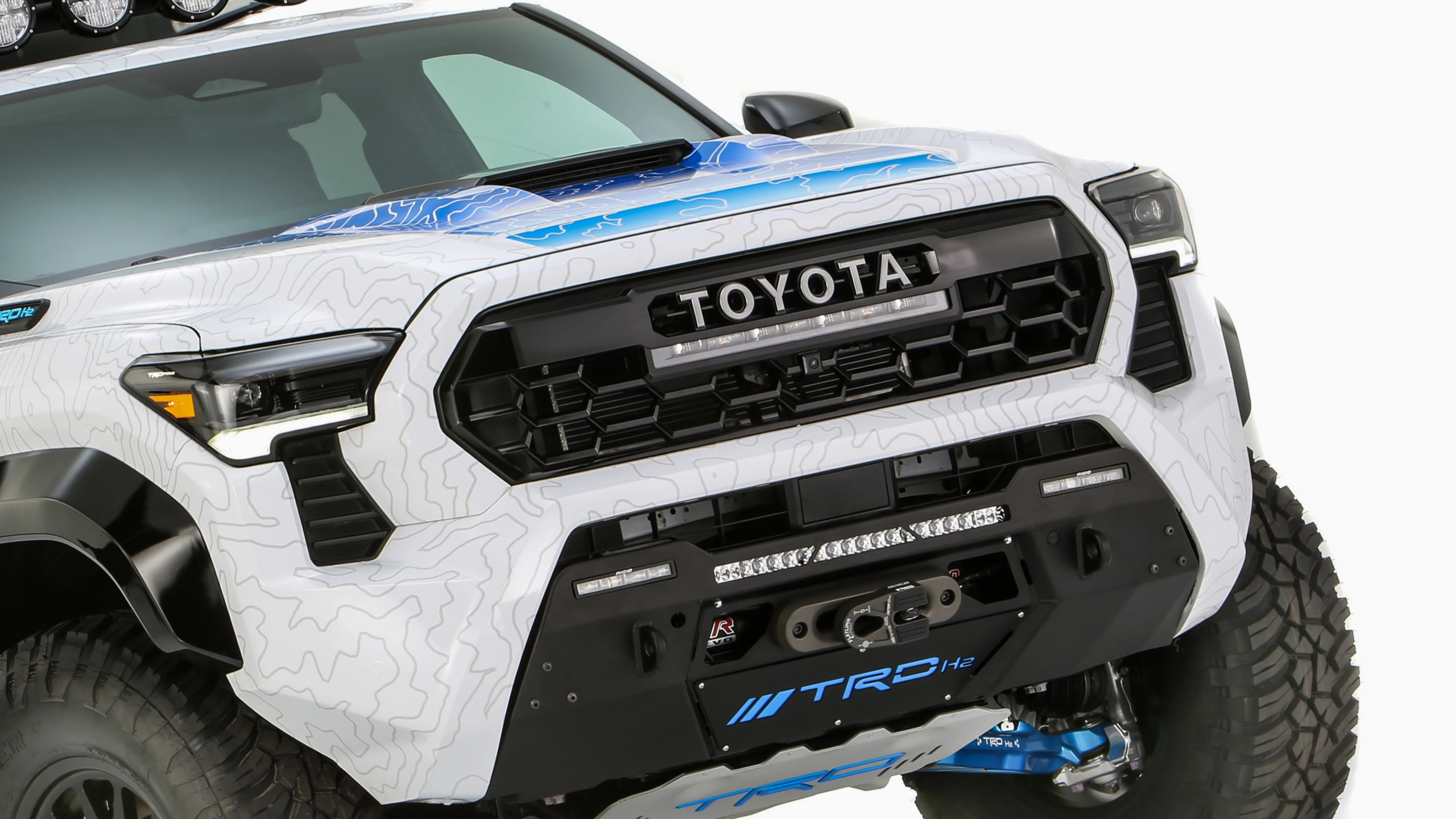The only thing coming out of this Taco’s tailpipe is pure water, and it even has a filtration system that allows you to shower with it.
Chris Chin
·
This may look like your average, fourth-generation “N400” Tacoma. But it isn’t. Rather, under the hood of this rad-looking SEMA concept lies the sort of witchcraft and wizardry from the future.
That would be hydrogen fuel-cell technology, which is indicated by the “H2” portion of the Tacoma H2-Overlander Concept. Toyota just revealed the truck as one of its many debuts at this year’s Specialty Equipment and Manufacturers’ Association Show in Las Vegas.
While the prospect of a Tacoma-based overlander is nothing new, the H2-Overlander Concept revitalizes another still promising prospect. Which interestingly, isn’t new, either.
The Tacoma H2-Overlander Concept may sport the usual upgrades to make for one badass overlanding rig. Such includes an aftermarket FOX 2.5 Performance Elite Series lift and shock absorber kit, which is bolstered by a TRD-sourced billet long-travel support system for greater axle articulation.
There are also beefed-up brakes, custom 17-inch wheels wrapped in 35-inch all-terrain tires. And of course, let’s not forget the custom bed cover and the roof-mounted pop-up tent, lightbar and heavy-duty winch.
But in place of the usual gas-powered 2.4-liter “i-Force Max” turbocharged inline-four is Toyota’s latest hydrogen fuel-cell propulsion system. And it’s the Japanese automaker’s latest attempt at expressing continued interest in the technology as a path towards the future.
Like other fuel cell vehicles, or FCVs, the Tacoma H2-Overlander is basically an electric vehicle. But rather than relying solely on electrons and an outrageously heavy battery pack that takes ages to recharge, the Tacoma H2 instead runs off of compressed liquid hydrogen.
The system essentially burns compressed liquid hydrogen, which then powers a battery pack and electric motor to drive the wheels. But the best part: all that’s expelled out of its tailpipe is pure water and the liquid hydrogen tank can be refilled in minutes like a conventional gas tank.
What’s even cooler about the Tacoma H2-Overlander is that it features a patent-pending “exhaust water recovery system.” Yep, you read that correctly.
Developed by Toyota Racing Development, that exhaust water recovery system essentially collects the water vapor produced by the hydrogen fuel-cell’s combustion process. It then filters and stores said water in a separate tank as a potable water supply.
Toyota doesn’t recommend drinking the water. But in any case, that’s peak recycling right there.
Topping it all off, the Tacoma H2-Overlander also features an advanced battery pack that not only drives its 547-horsepower dual electric motor system. It can also be used to recharge other EVs with up to 15 kilowatts, thanks to dual NEMA 14-50 outlets.
But why hasn’t this technology taken off and become more common? Well, it’s a bit complicated.
Although hydrogen fuel-cell technology has been around since the mid-19th century and in cars since the early 20th-century, automakers didn’t really start experimenting with it until the 1990s and 2000s.
But as they began further diving into it, many realized it’s incredibly expensive technology. Additionally, although hydrogen is the most abundant and renewable element in the universe, it’s also exceptionally difficult and inefficient to extract and store.
Not only does it require a lot of energy to produce and store liquid hydrogen. In conventional energy conversion theories, hydrogen power is inefficient in that it takes more to put into the process than one gets out of it.
That essentially nullifies the potential benefits. Especially the ones where it only requires simple fill-ups and the only byproducts emitted out of its tailpipe are pure water.
This is on top of the fact that fuel-cell technology also requires a lot of expensive, precious metals.
But like all technologies, they improve with time, research and development — just like the prospect of electric cars has. And so, Toyota still believes it’s still a potential technology worth investing in.
In recent years, many, if not all automakers jumped on the electrification train to produce more EVs. The premise was to start making electric cars to help reduce overall carbon-based tailpipe emissions for the sake of polar bears and rare trees.
This focus on EVs, however, put other potential technologies, such as hydrogen fuel-cell vehicles on the backburner. But after the market revealed that pure EVs aren’t as well-received as initially thought, automakers are revisiting other ideas.
For Toyota, that means dusting off the books on hydrogen FCVs. Toyota’s not new to the world of hydrogen fuel-cell vehicles. The automaker was one of the first to experiment with the idea and actually lease private vehicles to early adopters.
Such examples include the FCHV, which was based on the first-generation Highlander in the 2000s. And more recently, the Mirai sedan, which is still on sale today.
As automakers continue chasing the ever-so elusive solution to renewable and clean energy-based propulsion, Toyota reemphasized that it doesn’t believe pure electrification is the true future.
The Tacoma H2-Overlander Concept proves the technology still offers some promise. It just needs more time and resources, which hopefully will make it all the more viable.
Want to stay up to date on the latest product news and releases? Add Gear Patrol as a preferred source to ensure our independent journalism makes it to the top of your Google search results.
Founded in 2007, Gear Patrol is the definitive buying guide for enthusiasts. Our independent experts test the best in cars, tech, home, outdoors, style and watches. We combine hands-on testing, decades of experience and original photography to craft reports, reviews and guides. Why? Because we believe everyone deserves the best product.
Work with our award-winning creative services studio and advertising agency to bring your brand or product story to life. Learn more.
© 2025 GPS Media – Guides, Products, Services | For Life's Pursuits™












